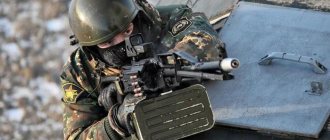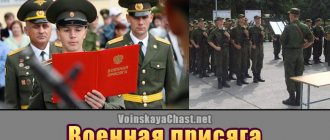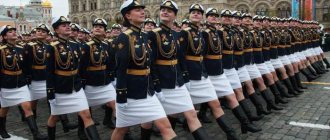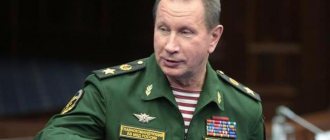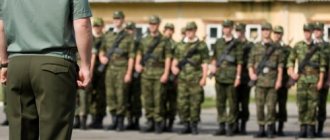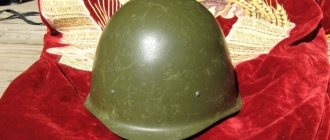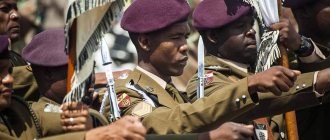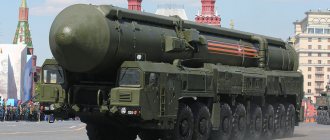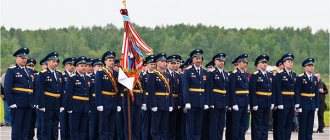THE NEED FOR DEVELOPING A NEW MILITARY DOCTRINE OF THE RF
The need to create a single document called “Military Doctrine of the Russian Federation” appeared at the end of the last century. By this time, practically all developed countries had already created sets of normative documents of a military-political nature, and their existence was fully justified. For example, in the United States, a set of fundamental US conceptual documents on issues of ensuring national and military security is represented by the National Security Strategy, the National Defense Strategy (analogous to our Military Doctrine) and the very current National Military Strategy. On the basis of the latter document, operational planning for the use of the Armed Forces is carried out, promising strategic and operational concepts for their use are developed, which, having been brought to the level of theory by military science, are used as the basis for the regulations of the Armed Forces and plans for their reform.
In addition, in the United States there is a mechanism for correcting the provisions of documents through the annual reports of the Secretary of Defense to Congress and the “White Book” of the Chairman of the Committee of the Chiefs of Staff of the Armed Forces.
In Russia, also in November 1993, the President of the Russian Federation approved a document entitled “Basic provisions of the Military Doctrine of the Russian Federation.” The appearance of the document was preceded by a wide discussion in the media, as well as a productive military-scientific conference at the All-Russian Academy of Civil Aviation, at which the fundamentals of the theory of military doctrine were discussed and subsequently published in the academy’s scientific collection.
The definition contained in the text of the current doctrine generally corresponds to the requirements of the theory: “Military doctrine is a system of views officially accepted in the state on preparation for armed defense and armed defense of the Russian Federation.”
In essence, these are the officially accepted and proclaimed views of the military-political leadership on the use of armed violence in the interests of achieving political goals. That is why, in accordance with the requirements of the theory, the Russian Military Doctrine answers the following five main questions:
- with which opponents and how to prevent military conflicts;
- what may be the nature of armed struggle in conflicts, the goals and objectives facing the state and its armed forces in the course of their conduct;
- what kind of military organization needs to be created for this and in what directions to develop it;
- in what forms and methods to conduct armed struggle;
- how to prepare a country and its military organization for war or the use of force in armed conflicts.
In this regard, the content of the military doctrine of the Russian Federation is primarily determined by the long-term economic interests of the state, which need to be protected, as well as the level of the country’s capabilities to conduct armed struggle, depending on its economic development, the state of social and scientific and technological progress of society.
Military doctrine has normative, organizational and informational functions, which determine its exceptional importance in preparing the country and its military organization to protect national interests using military force.
MILITARY DOCTRINE OF THE RF: BASIC CONCEPTS, STRUCTURE AND CONTENT
In general, the Military Doctrine of the Russian Federation expresses a very restrained attitude towards the role and tasks of strategic nuclear weapons, with increased attention to non-nuclear strategic weapons as a powerful deterrent in the foreseeable future, and in this is quite consistent with current foreign policy.
Basic Concepts
The document even introduced a new concept of “non-nuclear deterrence system,” which is a set of foreign policy, military and military-technical measures aimed at preventing aggression against the Russian Federation by non-nuclear means.
According to the Military Doctrine of the Russian Federation, the priorities of military policy and military development in descending order can be presented as follows:
- nuclear deterrence with a relatively high level of forces and an emphasis (when creating a new heavy missile) on a first or retaliatory strike (the vast majority of nuclear weapons), and with the revival of railway combat missile systems and increasing the potential of strategic attack submarines - and on a retaliatory strike;
- aerospace defense against massive strikes by high-precision non-nuclear weapons from the United States and its allies;
- major regional conflicts with NATO on the northern, western and southwestern borders of the Russian Federation and the CIS;
- regional conflict in the Far East;
- territorial conflict with Japan;
- repelling single provocative or accidental missile strikes (missile defense system of the Moscow region);
- local conflicts and peacekeeping operations within the country, along the perimeter of the borders of the Russian Federation and in the post-Soviet space;
- actions in the Arctic zone and against piracy in the Indian Ocean.
Military doctrine of the Russian Federation |
The classification of wars and military conflicts has remained unchanged. Unfortunately, the document still lacks a clear definition of the concept of “war,” which causes various misunderstandings.
In this regard, the following interpretation of the term “war” : this is the highest form of resolving fundamental contradictions between states, coalitions of states and social groups of the population of one state through the use of intense armed violence, accompanied by other types of confrontation (political, economic, informational, psychological, special operations forces etc.) in the interests of achieving certain political goals.
In addition, in the changed geopolitical conditions, it seems relevant to exclude the simplified approach to classifying wars based on one or two criteria. A systematic approach is required using several criteria, at least from those presented below.
According to the level of technological development of the warring parties : wars between technologically underdeveloped states; wars between technologically highly developed states; mixed type - wars between highly developed and underdeveloped states.
According to the strategy used to achieve goals : wars using the strategy of crushing the enemy, primarily in the physical sense; wars, the basis of which is the use of a strategy of indirect actions (destabilization of the political and economic life of the state, the creation of a situation of “controlled chaos” within the country, indirect or direct military support for the armed opposition in order to bring the necessary political forces to power); mixed type or “hybrid wars” - wars that combine at different stages the complex application of the strategy of destruction and indirect actions.
By scale of use of armed violence : local, regional, large-scale.
According to the means of armed struggle used : nuclear wars; using the full range of weapons of mass destruction; using only conventional means of destruction; with the massive use of weapons based on new physical principles.
In relation to the norms of international law : just wars - in defense of independence, sovereignty and national interests; unjust - falling under the international definition of aggression.
According to the composition of the participants in the armed confrontation : between two states; between coalitions of states; between a coalition and one state; civil wars.
The new Military Doctrine of the Russian Federation modernizes the concepts of local, regional and large-scale wars.
A local war is a war pursuing limited military-political goals, in which military operations are conducted within the borders of opposing states and which primarily affects the interests of only these states (territorial, economic, political and others). Under certain conditions, a local war can escalate into a regional or large-scale war.
Regional war is a war involving several states of the same region, waged by national or coalition armed forces, during which the parties will pursue important military-political goals.
A large-scale war is a war between coalitions of states or the largest states of the world community, in which the parties will pursue radical military-political goals.
Nothing has changed regarding the classification of armed conflicts. The doctrine proposes to divide them into domestic and international.
Military threats to the country according to the Military Doctrine of the Russian Federation
The second section of the document “Military dangers and military threats to the Russian Federation” has undergone the biggest changes. First of all, it notes a clear increase in tension in various areas of interstate and interregional interaction against the backdrop of a general deterioration in the international situation. This is associated with increased global competition and rivalry, instability of economic development processes and a redistribution of influence on world development in favor of new centers of power. The tendency for military threats to shift into the information space and the internal sphere of the Russian Federation is also recognized as dangerous. It is also noted here that in a number of areas the military dangers for the Russian Federation are increasing.
The new edition of the Military Doctrine of the Russian Federation specifies, in relation to the emerging trends in the development of the military-political situation, the sources of external military danger set out in the National Security Strategy: this is, first of all, building up the force potential and expanding the NATO bloc, bringing its military infrastructure closer to the borders of the Russian Federation; destabilization of the situation in individual states and regions.
An undoubted danger is posed by the deployment (buildup) of groups of troops of foreign states (including armed international radical groups and foreign private military companies) in territories adjacent to the Russian Federation and fleet forces in adjacent waters. These same sources include the creation and deployment of strategic missile defense systems, which undermines global stability, as well as the militarization of outer space, and a new source is being added - the deployment of strategic non-nuclear precision weapon systems in the interests of implementing the concept of a “prompt global strike.”
A direct external military danger to the Russian Federation is also posed by territorial claims against it and its allies, interference in their internal affairs, the presence of armed conflicts in the territories of states neighboring the Russian Federation, the proliferation of weapons of mass destruction, missiles and missile technologies, an increase in the number of states possessing nuclear weapons, and the spread of international terrorism. New dangers also lie in the establishment in the territories of states adjacent to the Russian Federation with foreign assistance of regimes hostile to it, as well as the subversive activities of intelligence services and organizations of foreign states and their coalitions against the Russian Federation.
The Russian military doctrine still lists the following as the main internal military dangers:
- attempts to forcibly change the constitutional system of the Russian Federation;
- destabilization of the internal political and social situation in the country;
- disorganization of the functioning of government bodies, important state and military facilities and the information infrastructure of the state.
Of particular concern are the actions of terrorist organizations, information influence on the population with the aim of undermining historical, spiritual and patriotic traditions in the field of defense of the Fatherland, as well as provoking interethnic and social tension, inciting ethnic and religious hatred.
Under certain conditions, military dangers acquire a targeted nature, as a result of which they can develop into specific military threats.
The Russian Military Doctrine recognizes the following as the main threats:
- a sharp aggravation of the military-political situation (interstate relations) and the creation of conditions for the use of military force, and also, which is very important, obstruction of the work of the state and military control systems of the Russian Federation,
- disruption of the functioning of its strategic nuclear forces, missile attack warning systems, space control, nuclear weapons storage facilities, nuclear energy, nuclear, chemical industries and other potentially dangerous facilities.
In addition, the following are recognized as military threats:
- creation and training of illegal armed groups, their activities on the territory of the Russian Federation or on the territories of its allies;
- demonstration of military force during exercises in adjacent territories.
An important threat is considered to be the intensification of the activities of the armed forces of individual states (groups of states) with partial or complete mobilization, transfer of state and military control bodies of these states to work in wartime conditions.
Features of modern military conflicts
The same section of the Military Doctrine of the Russian Federation outlines the characteristic features and peculiarities of modern military conflicts.
This is first of all:
- comprehensive use of military force, non-military forces and means using the protest potential of the population and special operations forces;
- massive use of modern weapons systems and military equipment, as well as those based on new physical principles and comparable in effectiveness to nuclear weapons;
- impact on the enemy to the entire depth of his territory simultaneously in the global information space, in aerospace, on land and sea;
- selectivity and high degree of destruction of targets, speed of maneuver by troops (forces) and fire, use of various mobile groupings of troops (forces);
- reduction of time parameters for preparation for military operations;
- strengthening the centralization and automation of troops and weapons control as a result of the transition from a strictly vertical control system to global network automated systems for controlling troops (forces) and weapons;
- creation of a permanent zone of military operations on the territories of the warring parties.
At the same time, the following are considered fundamentally new:
- participation in military operations of irregular armed groups and private military companies;
- the use of indirect and asymmetric methods of action;
- the use of externally financed and controlled political forces and social movements.
Military policy of the Russian Federation
The main tasks of the military organization of the Russian Federation in wartime |
The third, main section of the Doctrine is devoted to issues of military policy of the Russian Federation. At the same time, the document proposes to understand military policy as the activities of the state in organizing and implementing the defense and ensuring the security of the Russian Federation, as well as the interests of its allies.
It clearly defines the direction of the military policy of the Russian Federation:
- deterrence and prevention of military conflicts;
- improving the country's military organization;
- improving the forms and methods of using the Armed Forces, other troops and bodies;
- increasing mobilization readiness in order to ensure the defense and security of the Russian Federation, as well as the interests of its allies.
The Russian Military Doctrine clearly confirms that nuclear weapons equipped with the Russian Armed Forces are considered, first of all, as a factor in deterring aggression.
In this regard, the Russian Federation reserves the right to use nuclear weapons in response to the use of nuclear and other types of weapons of mass destruction against it and (or) its allies, as well as in the event of aggression against the Russian Federation using conventional weapons, when its very existence is at risk states. It is obvious that a critical situation requiring the use of nuclear weapons can arise only as a result of aggression and only when its consequences raise the question: to be or not to be Russia?
The third section also reflects issues of the use of military organization. The military doctrine of the Russian Federation considers it legitimate to use force to repel aggression, maintain (restore) peace, and also to ensure the protection of its citizens located outside the Russian Federation. At the same time, the use of the armed forces and other troops and bodies is carried out decisively, purposefully and comprehensively on the basis of an early and constant analysis of the military-political and military-strategic situation, taking into account all the requirements of international law. It also clearly defines the main tasks of the country's military organization in peacetime, during the period of increasing threat of aggression and in wartime.
It is noteworthy that in the new edition of the Military Doctrine of the Russian Federation, the tasks of peacetime have been added: ensuring the national interests of the Russian Federation in the Arctic. The tasks during the period of growing threat of aggression were quite rightly added: “strategic deployment of the armed forces.” The following was added to the main objectives of the development of the military organization: “development of the mobilization base and ensuring the mobilization deployment of the Armed Forces, other troops and bodies, as well as improving the methods of recruiting and training mobs. human reserves and resources; improvement of the NBC protection system of troops (forces) and the population.”
Mobilization preparation
Unlike previous versions of the doctrine text, the new Military Doctrine of the Russian Federation pays special attention to the issues of mobilization preparation and mobilization readiness of the Russian Federation (fourth section).
The doctrine clearly defines that the purpose of mobilization preparation is to prepare the country, its armed forces, other troops and bodies to ensure the defense of the state from an armed attack and meet the needs of the state and the needs of the population in wartime.
All this suggests that the military-political leadership of the Russian Federation takes into account the increasing likelihood of our country being drawn into a large-scale war, which will require the total mobilization of the moral, economic and military forces of the population and the state. Moreover, the document deals not so much with the armed forces, but with the country as a whole.
Military policy of the Russian Federation in modern conditions
MILITARY THOUGHT No. 11/2008, pp. 2-10
Military policy of the Russian Federation in modern conditions
Colonel in reserve
V. I. LUTOVINOV ,
Doctor of Philosophy
Vladimir Ilyich LUTOVINOV was born in 1952 in Perm. After graduating from the Sverdlovsk Higher Military-Political Tank-Artillery School (1973), he served as a political officer in the Far Eastern, Baltic, and Moscow military districts, as well as in the Northern Group of Forces (Poland). After graduating from the military pedagogical faculty of the Military Academy named after V.I. Lenin (1986) served as a teacher, then deputy head of the department of the Military University of the Ministry of Defense. In 1990 he defended his candidate's dissertation, and in 1998 - his doctoral dissertation. From August 1998 to April 2004 - deputy head of the department of the Main Directorate of Educational Work of the Armed Forces of the Russian Federation, head of the group, deputy head and head of a separate department of the Center for Military-Strategic Research of the General Staff of the RF Armed Forces. In May 2005, he was appointed deputy director of the publishing house. He has more than 350 published scientific, educational, methodological and journalistic works. Academician of the Academy of Military Sciences, the Academy of Geopolitical Problems and the International Pedagogical Academy. Since 2001, he has been a professor at the Department of National Security of the Civil Registry of Civil Aviation under the President of the Russian Federation, a leading researcher at the State Research Institute of Family and Education of the Russian Academy of Education, an expert at the State Research Institute of System Analysis of the Accounts Chamber of the Russian Federation. The total teaching experience in higher education is 22 years.
He was awarded the Grand Silver Medal of the International Pedagogical Academy for achievements in the field of education, culture and science, and in 2007 - the Patriot of the Fatherland medal for active participation in the work of patriotic education of Russian citizens.
In the MILITARY Encyclopedia, military policy
is defined as
“a system of public views, relations and institutions, as well as the activities of the state and its individual structures, other socio-political institutions of society, determined by them, aimed at the creation, preparation and use of military force for political purposes.”
Military policy
is
an integral part of the general policy of the state, directly related to the creation of a military organization, the preparation and use of military means to achieve certain political goals to ensure the military security of the country (Fig. 1).
It represents a complex area in which political decisions on military security greatly affect the fate of people and states.
Military policy is an integral part of the overall system of political activity of the state. It represents ideological, theoretical, organizational and practical activities to strengthen the country’s defense capability, manage its armed forces, and their comprehensive improvement in order to ensure military security.
The highest goal of military policy is to ensure reliable protection of the sovereignty and territorial integrity of the state. An important place in military policy is occupied by preparing the country, people and army to repel any aggression, strengthening the military power of the state, developing the defense industry, and comprehensively improving military construction.
The goals of military policy are constantly specified through a certain set of relevant tasks, solved in a certain period of time, taking into account the peculiarities of the development of the military-political situation, regions of the country, as well as the material and financial capabilities of the state.
Of particular importance in understanding military policy are its scientific nature, taking into account the requirements of life itself, military theory and practice. The strict scientific nature of military policy is closely connected with the real development of the state, with a sober account of objective reality in all its complexities. Its important features are its creative nature, a comprehensive analysis of the course of events in the country and in the world and the ability to influence their development.
Rice. 1. Contents of the military policy of the Russian Federation
The military policy of the Russian Federation is a necessary element of domestic and foreign policy activities aimed at ensuring the national security of the state, preventing wars and armed conflicts, and strengthening strategic stability. It arose at the intersection of national policy and military strategy and includes the activities of socio-political forces and state institutions specially created by them. The creation of military force, reliance on it or its use to achieve political goals is the essence and main purpose of military policy.
The military policy of the Russian Federation at the present stage is intended to:
maintaining the country's defense potential at a level adequate to existing and potential military threats, taking into account the country's economic capabilities and the availability of human resources;
preventing large-scale military clashes, helping to end and prevent armed conflicts in the CIS, promptly neutralizing any military provocations;
fulfillment of the international obligations of the Russian Federation to provide military assistance to countries allied with it;
ensuring decisions of the UN Security Council and other international organizations for maintaining peace and security at an earlier stage of development of a conflict situation;
assessing the possibilities, necessity and limits of the use of military force to achieve political and military goals;
developing methods of using military force, ways to counter potential and real enemies, organizing interaction with allied states to prevent and repel aggression.
Russia’s military policy expresses the complexities and problems of the state and development of society, “...especially the severity and contradictory nature of the political struggle, the instability of the economy, social relations and some uncertainty of the spiritual mood...”.
The military policy of the Russian Federation is determined by the economic, political and other interests of the state, expressed in the National Security Concept, Military Doctrine, and other documents.
Economic and political interests determine the main essence, content and direction of the military policy of the Russian Federation. It must ensure favorable, mutually beneficial economic, political, cultural, scientific and other connections and relations with all, especially neighboring countries. An important role in shaping Russia's military policy is played by taking into account its potential and real capabilities to realize its interests.
Potential opportunities are expressed by characteristics that can be obtained with maximum effort and resources of society and the state. Real opportunities depend on the state of the economy (gross national product), the quantity and quality of the population, the level of scientific and technological achievements, quantitative and qualitative indicators of military power - primarily the Armed Forces of the Russian Federation.
The internal and external conditions of the state's life are determined by the goals and means of military policy. Gradual or sudden changes in these conditions may necessitate a revision of the goals and means of military policy and actions to increase or decrease military power.
Basics of military policy
predetermine the material and spiritual principles on which policy is developed and implemented
and
by which its content, direction, goals and capabilities are determined. The fundamentals are objective. They really exist and should serve as a support for specific institutions and individuals involved in developing and implementing a political course. The main role here belongs to the material, scientific and constitutional foundations.
The method of production, the type of ownership, and the material and technical base of the state are the material basis of military policy. They determine the possibilities of military policy, its settings, tasks and ways to solve them. Knowledge and consideration of material foundations make it possible to determine the tasks and goals on which efforts must be concentrated in order to apply the existing military-economic potential, financial and human resources to ensure the military security of the country.
The scientific basis of military policy is knowledge of the existing military-political situation, theoretical and methodological provisions that form its foundation, serving its justification, planning, development and implementation. Only knowledge and practical application of the fundamentals of military art will allow us to count on effective preparation of the country and its Armed Forces to repel possible aggression.
Military policy uses the achievements of social, natural and technical sciences, and military theory. With their help, the country's defense power is strengthened and military construction is carried out.
The constitutional foundations of military policy are enshrined in the Constitution of the Russian Federation, which guide the state in developing and implementing defense policy.
The development of the foundations of Russian military policy is carried out on the basis of:
knowledge and in-depth study of the military-political situation of the enemy (real and potential), his possible plan of action, goals and capabilities; research into the state of political forces within the country and in the international arena; comprehensive justification of the goals and objectives of military policy with their consistent implementation; forecasting military-political activity; assessing the compliance of the intended goals and objectives of military policy with the capabilities of the country.
This makes it possible to reasonably determine the course of military policy and avoid underestimating or overestimating the enemy’s and one’s own forces. During the development of military policy, the necessary prerequisites for the practical implementation of the goals envisaged by it are laid.
It is difficult to distinguish between the processes of developing and implementing military policy. These two processes merge and form a common organic system of continuous leadership activity in the military field. When developing and implementing military policy, one should be guided by a group of principles of this policy.
Principles of military policy
are based on general conclusions, rules and guidelines arising from the study of the objective laws of this policy and can be general and specific. General are the principles of guiding political activity that are applied in various areas of policy, taking into account the uniqueness of a particular area; concrete are the principles of the area under consideration.
The activities of the highest authorities and military leadership in the field of military policy are based on the following general principles:
objectivity and comprehensiveness,
conditioned by the main laws of social development and providing for a deep analysis of the actual military-political situation based on the study of facts, events and processes;
specificity and information content,
focused on a comprehensive accounting of reliable information about the specific historical conditions in which military policy is formed and implemented;
complexity and consistency,
meaning the balance of all components of the state’s military power;
certainty and openness,
which is manifested in the formation of a mechanism for the coordinated development of military doctrinal provisions and in the official adoption of military policy by the highest bodies of state power;
efficiency and optimality,
involving the creation of favorable conditions for the implementation of the goals and objectives of military policy, the most rational use of military potential;
focusing efforts on the main link,
defining the central issues of both military policy and military strategy;
use of advanced military technologies,
ensuring priority to the quality characteristics of modern weapons and military equipment;
priority of a strategy of a defensive, deterrent nature,
determining the solution of military security problems;
taking into account the economic capabilities of the country
when performing tasks to increase defense capability, ensuring the necessary expenditure of forces and funds for military needs;
unity of political and military leadership,
allowing one to combine political efforts with the achievements of modern military science;
centralization of leadership
military policy of the state;
management flexibility
forces and means to deter the enemy from aggressive actions;
demonstration by the military-political leadership of the country of determination in implementing tasks,
ensuring an adequate response to a specific military danger or threat from the enemy;
other principles
military policy, ensuring the neutralization and localization of military dangers and threats to the state.
Of the variety of tasks of military policy, the main ones can be considered the following:
justification and development of military-political decisions, preparation of specific plans for the functioning and development of the state’s military system. The importance of this task is confirmed by the fact that the military-political situation, both external and internal, is subject to constant changes. To one degree or another, they affect the national interests of the state and therefore require timely response and prompt decision-making;
regulation of military-political relations with other states, coalitions, blocs. In this issue, the main role is played by diplomacy, which may include the settlement of border issues, negotiations on arms reduction, problems of cooperation with allied states on military issues, search, establishment of contacts and dialogue with military-political blocs (unions) and individual states, etc. ;
development of the state’s military doctrine, which determines the basis of its military-political activities;
organization of information support for decision-making, plans and military actions;
protecting the independence of Russia, ensuring its security, sovereignty, inviolability of borders, territorial integrity, deterring the outbreak of wars and armed conflicts directed against it;
maintaining defense potential at a level adequate to existing and potential military threats, taking into account socio-economic and financial capabilities.
Military policy is not a separate sphere of socially significant activity. It represents “... one of the aspects of the more general domestic and foreign policy of states,” such a component of it, “... which extends to a special area of activity” - military theory and military practice of states and other political subjects.
The military policy of the Russian Federation, like any other modern state, includes two interconnected sides - internal
and
external.
Being in a dialectical unity, the internal and external sides have their own characteristics, determined by a number of factors.
The inner side of military policy
covers problems directly related to the preparation of military force to resolve intrastate conflicts or resolve crisis situations within the country.
Internal crisis situations
can be:
a) illegal activities of extremist nationalist, religious, separatist and terrorist movements, organizations and structures aimed at violating the unity and territorial integrity of the Russian Federation, destabilizing the internal political situation in the country;
b) planning, preparation and implementation of actions aimed at disrupting the functioning of government bodies, attacking state, economic, military facilities, life support facilities and information infrastructure;
c) creation, equipment, training and functioning of illegal armed groups;
d) illegal distribution (trafficking) on the territory of the Russian Federation of weapons, ammunition, explosives and other means that can be used to carry out sabotage, terrorist acts, and other illegal actions;
e) organized crime, terrorism, smuggling and other illegal activities on a scale that threatens the military security of the Russian Federation.
The military policy of the Russian Federation, based on the Constitution of the Russian Federation and federal legislation, can use the country's Armed Forces and other troops to eliminate crisis situations and illegal armed groups within the country.
The federal constitutional laws “On a State of Emergency” and “On Martial Law” are aimed at regulating the internal situation in the country.
The external side of military policy
examines the problems of the use of military force in interstate relations. The military policy of the Russian Federation in foreign policy has undergone great changes in recent years. Under the influence of socio-economic and military-political changes in the country and the world, the confrontation characteristic of the confrontation of the Cold War period has been overcome. Since the end of the 20th - beginning of the 21st century, Russia's military policy has been distinguished by a balanced, constructive approach to solving the most complex problems, overcoming contradictions, and the desire to achieve positive results in the process of military-political cooperation with different countries.
When determining the structure of military policy
The Russian Federation has two main approaches.
The first
approach
determines the structure of military policy through the totality of its subjects and objects, goals, means and conditions in which it operates and develops (Fig. 2).
Rice. 2. The structure of the military policy of the Russian Federation.
The objects of military policy are those areas of life of Russian society that form the military potential and military power of the state - economics, science, technology, socio-political relations and structures, public consciousness, etc.
The mechanism of interaction between subject and object in the structure of military policy operates as follows. The state, as a subject of military policy, determines political goals and prepares appropriate means (both military and non-military) to achieve them. The use of these means affects the object of military policy.
The correspondence of goals and means to the specific conditions of a given military-political situation contributes to their successful implementation in the process of using military force. The desire to continue a military policy in which there is a significant imbalance between the goals set and the possibilities for achieving them can lead not only to its failure, but also to a crisis in the policy of the state as a whole.
The subjects of military policy are the highest bodies of legislative and executive power, the military leadership of the state, and military-political alliances.
Second approach
represents military policy as a set of starting ideas and principles of long-term action, military-political decisions and plans, general ideas and principles, practical actions aimed at implementing specific decisions and tasks.
A set of ideas and principles is set out in the Military Doctrine of the Russian Federation, the theoretical foundations of which were developed through a deep scientific analysis of military-political practice.
Military-political decisions and plans reflect the characteristics of a specific situation and correspond to the provisions and guidelines of the Military Doctrine. The degree and ability to implement the plans developed and decisions made determine the effectiveness of the implementation of military policy.
The military policy of the Russian Federation is designed to fulfill two main functions in the state.
First function
includes the development of the Concept of National Security, Military Doctrine, and the Fundamentals of State Policy of the Russian Federation on military development. Within the framework of this function, the following are determined: the principles of building the Armed Forces of the Russian Federation; plans for technical equipment of the army and navy, training and rational use of personnel; increasing the mobilization capabilities of the state; improving the system of training military-trained reserves and mobilization deployment; main directions of military reform; constant analysis and forecasting of the military-political situation; preparation of proposals to the military-political leadership on military policy issues; information support for developed plans and decisions made.
Second function
includes: management of military development in general and the development of the Armed Forces in particular; development of military-economic, social, political, demographic and spiritual potential in the interests of the country's defense; regulation of military-political relations with other states (coalitions), armies and subjects of military policy; leadership of military-political actions using military force within the country and abroad; coordination of the activities of all state institutions in the military sphere of society; education of the personnel of the Armed Forces, the entire population of the country in the spirit of patriotism, fidelity to duty, ensuring reliable protection of the territorial integrity and sovereignty of the state.
The theoretical, scientific part of military policy performs primarily ideological, methodological and educational functions, as well as some others.
Worldview function
allows a person to form correct ideas about the role of the country’s political system in his life, about the main values, about the importance and necessity of reliable defense of the Fatherland, about modern issues of war and peace.
It also involves identifying the role of each member of society in strengthening the country's military security, revealing the significance of each person's personal involvement in the
implementation of this responsible task.
A deeply conscious understanding of the goals and objectives of military policy increases the role of the most important institutions of society both in the direct defense of the country and in helping to ensure Russia’s national security.
Methodological function
military policy involves developing among leaders at different levels and military personnel the skills and abilities necessary to ensure the security of Russia, and the correct approach to understanding and solving problems in this area. It helps to identify, apply and improve methods and methods of activity in a specific area that will bring the greatest impact and high final results.
Educational function
is to form and strengthen Russian citizens’ ideological convictions and dedication to serving and defending the Fatherland through a system of the most important military policy guidelines and its provisions.
Military organizational function
is associated with the management of the country’s defense sector, all its bodies and units, and primarily the Armed Forces. It ensures the mobilization of all forces and means to maintain the country's military security and its defense.
Coordination function
acquires the greatest importance in wartime, when it is necessary to coordinate all issues in the military, social, economic, cultural and other spheres to ensure security. This function is also implemented in the international field to coordinate military efforts, for interaction between allied countries and various international organizations.
Prognostic function
used in both war and peacetime. This creates conditions for the successful activities of state and higher military bodies. The implementation of the predictive function of military policy allows the highest governing bodies of the state and the Armed Forces to most effectively organize work in the interests of military security.
Resolving issues of military policy and ensuring military security should be based on a thorough analysis of events taking place in the international arena, taking into account new historical conditions, as well as by identifying the main factors, trends, laws and patterns of their development. To qualitatively solve this important scientific problem, it is necessary, first of all, to develop a methodological apparatus and, on its basis, to determine the driving forces and main contradictions of globalization, the subjects behind them, methods and forms of resolving these contradictions, as well as the role of military force in resolving them. Only on the basis of such research can it be possible to develop recommendations on the formation of the state’s military policy, improvement of regional and global security systems, as well as on the direction of military development and development of the Armed Forces in the long term.
Military Encyclopedia. M.: Voenizdat, 2002. T. 6. P. 476.
Tyushkevich S.A. A new redistribution of the world. M.: Prospekt, 2003. P. 263.
Military Encyclopedia. T. 6. P. 476.
Right there.
